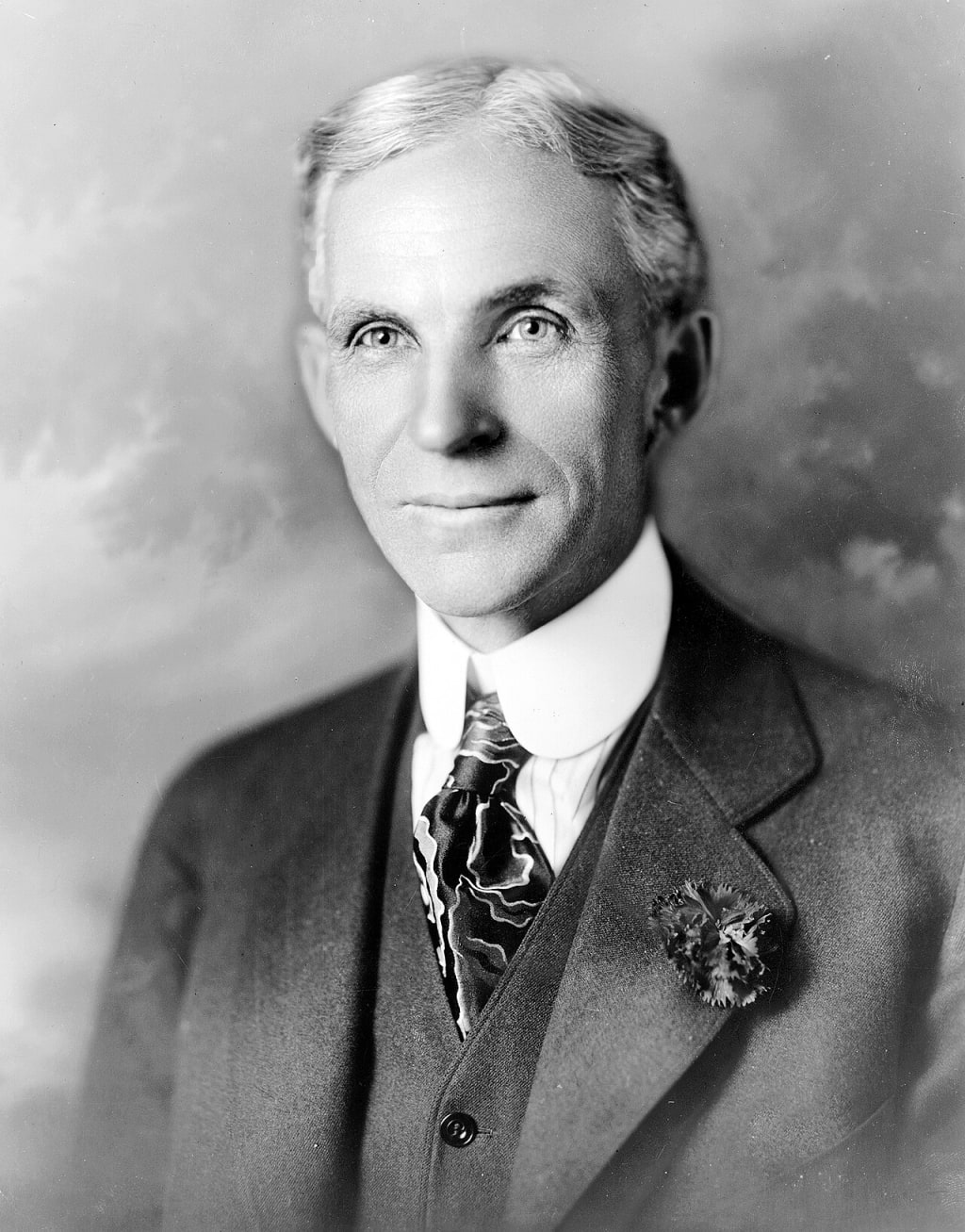
Henry Ford
Born July 30, 1863, in US.
Died April 7, 1947.
Henry Ford revolutionized automobile manufacturing with the assembly line, making cars accessible to millions. His innovations, like Model T, shaped modern transportation and industry, leaving a lasting impact on society
Henry Ford: A Pioneer in Automobile Manufacturing and Industrial Innovation
Henry Ford, born on July 30, 1863, in Greenfield Township, Michigan, United States, was a visionary industrialist and founder of the Ford Motor Company. His profound impact on the automotive industry and manufacturing processes has left an enduring legacy that continues to shape modern transportation and industry.
Early Life:
Ford's early life was marked by his fascination with machinery and engineering. Growing up on a farm, he developed a keen interest in understanding how things worked, especially the mechanical aspects of farming equipment. This curiosity laid the foundation for his future endeavors in the world of automobiles.
Founding the Ford Motor Company:
In 1903, Henry Ford, along with a group of investors, founded the Ford Motor Company. Initially, the company produced a series of cars, but it was Ford's revolutionary ideas and innovative approaches to manufacturing that would set him apart.
The Assembly Line Revolution:
Ford's most significant contribution to industrialization was the implementation of the assembly line in automobile manufacturing. In 1913, he introduced the moving assembly line at his Highland Park, Michigan, plant. This groundbreaking innovation allowed cars to be produced at a much faster rate and significantly reduced manufacturing costs.
The assembly line divided the production process into small, repetitive tasks, enabling unskilled workers to perform specific duties with efficiency. This not only increased production speed but also lowered the overall cost of manufacturing. As a result, the Model T, introduced in 1908, became the first mass-produced and affordable automobile, making car ownership accessible to millions of people.
The Model T and Mass Production:
The Model T, often referred to as the "Tin Lizzie," quickly became synonymous with affordable and reliable transportation. With its sturdy design and simplicity, the Model T captured the imagination of the public. The implementation of mass production techniques allowed Ford to bring down the cost of manufacturing, and by 1914, the price of a Model T had dropped significantly, making it an attainable option for a broader segment of the population.
By 1924, Ford's plant in Highland Park was producing over 1,000 cars per day, a remarkable feat at the time. The success of the Model T and Ford's manufacturing methods not only transformed the automotive industry but also had a profound impact on other sectors, influencing the way various products were manufactured.
Ford's commitment to efficiency and cost reduction extended beyond the assembly line. He introduced the concept of "welfare capitalism," implementing a $5 per day minimum wage for his workers, which was nearly double the industry average. This move aimed to reduce employee turnover and increase productivity by ensuring a stable and satisfied workforce.
Impact on Society and Industry:
Henry Ford's innovations in automobile manufacturing had far-reaching consequences for society and industry. The affordability of cars transformed transportation, making it more accessible to the middle class and contributing to the growth of suburbs as people could now live farther from their workplaces.
The Ford Model T became a symbol of American innovation and ingenuity, reflecting the spirit of progress during the early 20th century. The success of the assembly line and mass production techniques pioneered by Ford influenced not only the automotive industry but also manufacturing processes across various sectors worldwide.
Ford's Legacy and Later Years:
Henry Ford's influence extended beyond his contributions to the automotive industry. His emphasis on efficiency, mass production, and affordability left an indelible mark on industrial practices. Despite his success, Ford's resistance to change and reluctance to embrace new automotive trends in the 1920s led to a decline in the Ford Motor Company's market share.
In 1945, Ford resigned as president of the company, passing the leadership to his grandson, Henry Ford II. Henry Ford passed away on April 7, 1947, at the age of 83. His impact on the industrial landscape and society at large, however, continued to resonate long after his death.
Conclusion:
Henry Ford's legacy is one of innovation, industrialization, and societal transformation. His pioneering work in automobile manufacturing, particularly the introduction of the assembly line, revolutionized the industry and set new standards for efficiency and affordability. The Model T, with its mass production techniques, not only made car ownership accessible to millions but also left an enduring mark on the way products were manufactured across various sectors. Henry Ford's contributions to the automotive and manufacturing realms have secured his place as a visionary whose ideas and innovations continue to influence the world to this day.
Henry Ford, born on July 30, 1863, in Dearborn, Michigan, was a pioneering American entrepreneur best known for revolutionizing the automobile industry with the introduction of assembly line manufacturing techniques. His vision and innovations not only made cars affordable for the average American but also transformed industrial manufacturing and left a lasting impact on society. However, Ford's career was a blend of monumental successes and notable failures, reflecting the complex nature of innovation and entrepreneurship.
Successes
1. The Model T: Introduced in 1908, the Model T was Ford's most significant success. It was designed to be affordable, durable, and easy to maintain, making it accessible to a broad segment of the population. By 1927, Ford had sold over 15 million units, making it one of the best-selling cars of all time. The Model T fundamentally changed the way people lived, worked, and traveled, contributing significantly to the American car culture.
2. Assembly Line Production: Ford's introduction of the moving assembly line in 1913 revolutionized industrial manufacturing. This innovation drastically reduced the time it took to produce a single car, lowering costs and making the vehicles more affordable to the general public. The assembly line became a staple of modern manufacturing processes, influencing countless industries worldwide.
3. Worker Wages: In 1914, Ford introduced the $5-a-day wage for his factory workers, doubling the average wage of the time. This not only improved the standard of living for his employees but also helped to create a middle class, as workers could now afford to buy the products they were making. This approach was revolutionary and highlighted Ford's understanding of the economy as an ecosystem where paying workers more would lead to increased consumption and demand for products.
Failures
1. The Ford Edsel: While this occurred after Henry Ford's direct leadership, the Ford Edsel is often associated with his legacy due to the company's name. Introduced in 1957 by the Ford Motor Company, the Edsel was a commercial flop, costing the company an estimated $250 million (about $2.2 billion today). The Edsel's failure is attributed to a combination of poor marketing, customer dissatisfaction, and design issues. It stands as a testament to the challenges of innovation and market prediction.
2. Labor Relations: Despite his progressive wage policies, Ford's relationship with labor unions was fraught with conflict. He was vehemently opposed to unionization in his factories and employed harsh tactics to suppress organizing efforts, leading to several violent incidents. The most notorious was the Battle of the Overpass in 1937, where Ford's security men brutally beat United Auto Workers (UAW) organizers. Ford's stance on unions tarnished his reputation and highlighted the complexities of industrial relations.
3. Social Views: Ford's legacy is also marred by his controversial social views, particularly his anti-Semitic sentiments. He owned a newspaper, The Dearborn Independent, which he used as a platform to publish articles that promoted anti-Semitic conspiracy theories. In 1927, Ford issued a public apology for the hurt his publications caused, but the damage to his reputation had been done. His views have been a subject of criticism and have somewhat tarnished his contributions to industry and manufacturing.
Conclusion
Henry Ford was a figure of paradoxes—a visionary who revolutionized transportation and the industrial world, yet a man whose views and approaches to labor relations often clashed with the very principles of freedom and progress he helped promote. His successes have had a profound and lasting impact on the world, driving economic growth, shaping the modern industrial landscape, and transforming societal norms. However, his failures and the negative aspects of his legacy serve as reminders of the complexities of human nature and the multifaceted effects of innovation. Ford's story is a testament to the fact that success and failure are often two sides of the same coin, each contributing to the legacy of a remarkable individual.






Comments
There are no comments for this story
Be the first to respond and start the conversation.